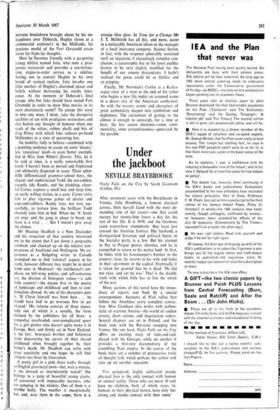Under the jackboot
NEVILLE BRAYBROOKE
Night Falls on the City by Sarah Gainham (Collins 30s) After seventeen years with the Burgtheater in Vienna, Julie Homburg, a famous classical actress, finds herself faced with the most de- manding role of her career—one that could
occupy her twenty-four hours a day for the rest of her life. It is 1938, and the Germans seem everywhere triumphant; they have just crossed the Austrian frontier. Her husband, a distinguished historian and political figure in the Socialist party, is a Jew. But his attempt to flee to Prague proves abortive, and he is compelled to return to his native land. At first, he hides with his housekeeper's brother in the country; later, he returns to his wife and hides in their apartment in the capital. Eventually it is taken for granted that he is dead. `He did not exist, and yet he was.' That is the double truth with which Julie has to live the whole of the war.
Many sections of this novel have the imme- diacy of reports sent back by a special correspondent. Accounts of Nazi rallies that follow the Anschluss carry complete convic- tion. Miss Gainham also writes with authen- ticity of wartime Austria—the world of sudden arrests, short rations, and deportation orders. Several chapters are set in Poland, and the book ends with the Russians sweeping into Vienna. On one level, Night Falls on the City offers an exciting story of hide-and-seek played with the Gestapo, while on another it provides a first-rate documentary of the crumbling Nazi empire. In the course of the book there are a number of provocative trails of thought laid, which perhaps the author will take up on another occasion: 'For pampered, highly cultivated people physical love is the only contact with human or animal reality. Those who are never ill and have no children, both of which states tie humans to their physical nature, have only this strong and slender contact with their roots.'






























 Previous page
Previous page